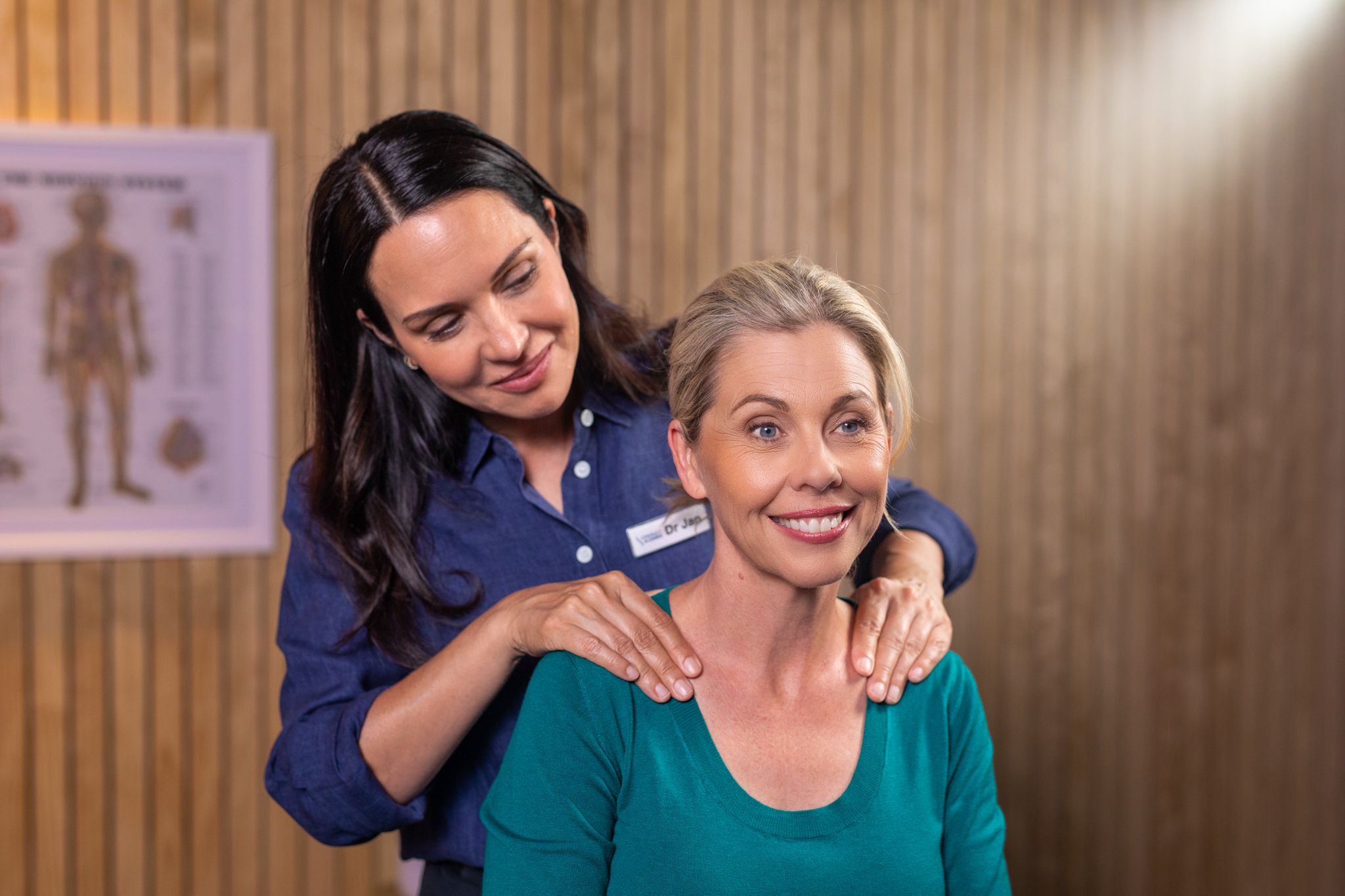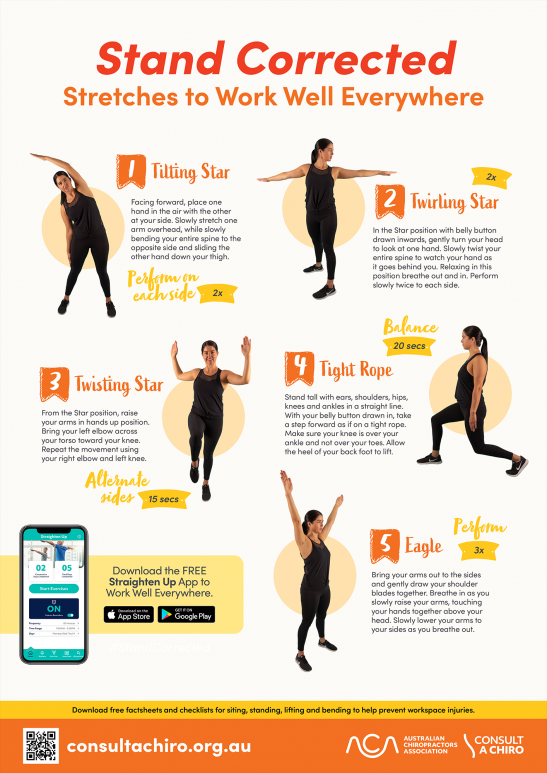WORKSPACE WEEK 21–27 OCTOBER 2024 - Work Well Everywhere
WorkSpace Health is EveryBODY's Business
SYDNEY - Oct. 23, 2024 - PRLog -- Work-related Musculoskeletal Disorders (WMSDs) and injuries are the leading workplace injury impacting Australian women according to Safe Work Australia, supporting the need for National WorkSpace Week.
With the increase in musculoskeletal cases projected to rise 43% over the next two decades, National WorkSpace Week (21-27 October 2024) aims to prevent the occurrence and impact of WMSDs through increasing awareness of the risk factors and building workplace capability to eliminate and reduce WMSD risks.
Of the 1006 respondents in the 2024 independent consumer survey, The Impact of Back Pain & Musculoskeletal Injuries in Australia; conducted by Pureprofile, 95.5% of female workers who engaged in occupations that involve a combination of sitting and standing reported the highest prevalence of musculoskeletal disorders (MSDs).
60.4% of women identified work as a contributing factor to 'back pain' compared to 55.8% of men with female workers in sedentary positions; jobs with little to no physical activity and usually seated throughout the day, reporting the highest prevalence of back pain at 89.1% with 27.9% of women identifying lifting, pushing or pulling as the trigger for back pain.
Women were more likely than men to experience a higher number of MSD types. Of the 462 female MSD sufferers, 12% experienced 1 or 2; 28.6% 3-to-6; 33.8% 7-to-9; and 27.3% reported between 10-12 different MSDs with women 22.5% more likely than men to experience 7-12 MSDs; with low back pain (82%), sprain or strain (75.5%), neck pain (71.5%) and mid back pain (70.6%) the most prevalent MSD reported by women.
Of those, 82% of women reported low back pain, with 28% experiencing low back pain weekly; 12% daily; 18% monthly; 15% occasionally (one every few months) and 15% seldom; while 33.7% reported that their MSD affected their movement or their ability to carry out daily activities.
An initiative of the Australian Chiropractors Association (ACA), WorkSpace Week aligns with Safe Work Australia's 'Australian Work Health and Safety (WHS) Strategy 2023–2033' to help create safe, healthy workspaces for everybody to lessen the long-term impact of WMSDs on workers, employers, and the economy.
Around 7.3 million (29%) Australians live with chronic musculoskeletal disorders (MSDs). Australia's third largest chronic health burden behind cancer and mental health, MSDs are a range of inflammatory and degenerative conditions affecting the muscles, tendons, ligaments, joints, peripheral nerves and supporting blood vessels that can lead to long-term headaches, neck and back pain.
According to a Deloitte Access Economics report, MSDs cost the Australian economy over $55 billion annually due to lost productivity, absenteeism, direct health costs and the reduced quality of life of sufferers.
Although the economic burden is high, for those who suffer WMSDs, the life-limiting cost to sufferers of unresolved WMSDs can be debilitating pain that restricts participation in family, social, and work activities, and has a negative impact on their mental health and overall wellbeing.
WMSDs may be caused by a single workspace event, but commonly result from repeated, harmful workspace activities over an extended period of time. Predominantly caused by physical stress, mental stress, repetitive work and poorly set up non-ergonomic workspaces, WMSDs account for the majority (57%) of workers' compensation claims for serious injuries.
According to Safe Work Australia, the most common injuries impacting Australians leading to WMSDs are body stressing, falls, slips and trips, with body stressing (33%) accounting for the highest percentage of WMSD workers' compensation claims. SafeWork NSW reports the cost per serious claim (requiring one or more weeks absence) averaged around $65,000 per serious claim between 2018-2023.
The Australian Government's Industry analysis: Health Care and Social Assistance reports strong jobs growth in the healthcare and social assistance sector over the past 20 years and is expected to continue to grow. Safe Work Australia's Key Work Health and Safety Statistics Australia 2024 identified this sector as the leading industry for serious claims (19.1%); ahead of the construction sector (12%). With 78% of the healthcare and social assistance sector being women, compared to 47% across all other industries, female workers in this industry are at greater risk of WMSDs.
ACA president, Dr Cahill said, "Workers in the health and social assistance sector are vulnerable to body stressing caused by the demands of their roles. Lifting, pushing, pulling and bending are often part of the nature of the work, so a proactive approach to prevention and early intervention is essential. The significant employment growth in this sector, up by 4,238,200 (48%) over the last 20 years, means this is an enormous source of pain, disability and reduced quality of life for sufferers.
"WMSD prevention and early intervention will have a significant impact on reducing the instances of WMSDs, minimise their impact, and reduce workers' compensation claims and overall health costs to the Australian economy," said Dr Cahill.
'The Impact of Work-Related Musculoskeletal Disorders & Injuries in Australia', a national independent survey of 1001 respondents commissioned by the ACA and conducted by Pureprofile revealed the high prevalence of WMSDs among Australian female workers. The most prevalent WMSDs reported by women were low back pain at 60%, neck pain at 57%, mid back pain at 52% and 56% reported tension/cervicogenic headaches.
Desk and computer work is also common among women and a significant contributor of WMSDs. 89% of workers who use a desk reported suffering a WMSD (including those who do a combination of desk work with standing and/or physical work) with female desk workers reporting the highest WMSD incidence (91%) compared to men (76%).
"To measure the physical activity of WMSD sufferers, in September 2024 the ACA conducted a member survey with almost half of ACA chiropractors surveyed (49%) reporting being seated or undertaking desk (computer) work as the primary trigger to WMSD presentations caused by sedentary positioning and repeated movements; most likely due to workers not taking regular breaks or stretching during work hours," Dr Cahill said.
"Using computers in non-ergonomic workspaces (in an office or at home), poor posture, driving a vehicle and repetitive strain injuries can all contribute to WMSDs including chronic neck and back pain, shoulder stiffness and headaches, while mental stress in the workspace is among the leading causes of WMSDs," he said.
"WorkSpace Week focusses on prevention, early intervention, non-surgical and drug-free treatments for WMSDs and other spinal health conditions caused by body stressing (lifting etc.), repetitive work and poorly set up workstations as well as work-related stress that can lead to a range of spine-related symptoms.
"If left untreated, WMSDs can lead to long-term chronic pain with possible life-limiting outcomes. Early diagnosis and treatment are key to preventing deterioration, improving recovery, reducing severity and helping to prevent long-term implications, including the reliance on medications for chronic pain that can be harmful.
"By promoting prevention and minimising long-term harm through early diagnosis and effective chiropractic healthcare, we can help improve the spinal health and overall wellbeing of workers while reducing the negative impact on employers and the economy," Dr Cahill said.
Because WorkSpace health is EveryBODY's business, to minimise workspace injuries and reduce the impact of WMSDs, employers and workers should visit workspaceweek.org.au to access a range of free resources including the WorkSpace Week Checklist, exercise posters, podcasts, factsheets and the Straighten Up app to maximise spinal health and wellbeing, minimise injuries and improve productivity for all working Australians so they can work well everywhere.
https://youtu.be/JvlHqorULBg?si=hYdObF4F633o4uC9
workspaceweek.org.au
#WorkSpaceWeek #WorkWellEverywhere #StraightenUpAustralia #ConsultAChiro #SafeWorkMonth
Photos: (Click photo to enlarge)




Source: Australian Chiropractors Association
Read Full Story - Women's Workspace Pain Epidemic: WMSDs & Australian Women | More news from this source
Press release distribution by PRLog













